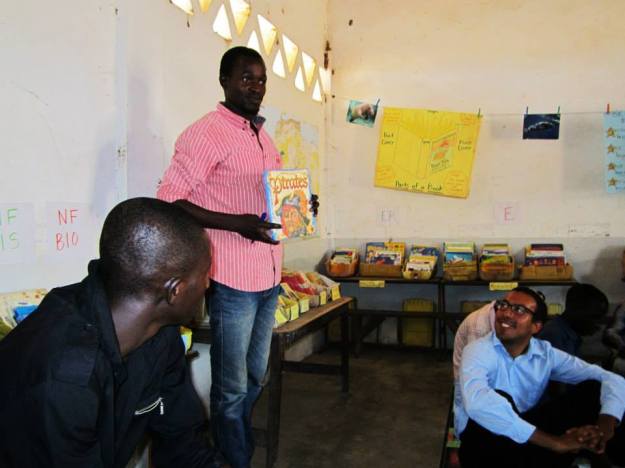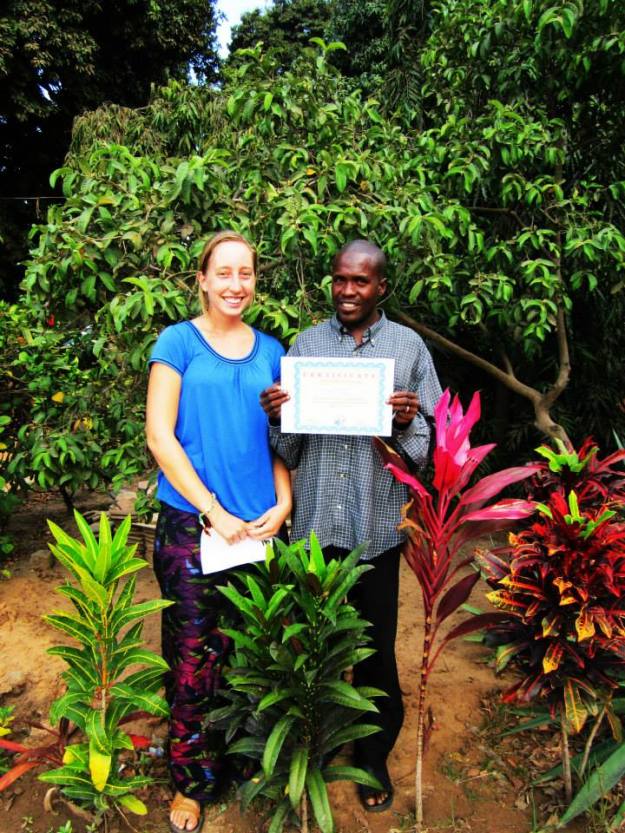Lessons for a Teacher Trainer in the Gambia
It wasn’t always easy, but I tried to stick to my primary mission in the Gambia, which was to train teachers. I learned a lot in my ongoing attempts at conducting school-based teacher trainings. The trainings I deliver today look and feel drastically different than the trainings I conducted in November of 2013. Here are the lessons that I have learned make the best teacher trainings in the Gambia.

My first teacher training in November 2013.
- Make the trainings a regular occurrence. Having weekly trainings or trainings twice a month means teachers know what to expect and are prepared to dedicate their time. Spring a training on a teacher and the training becomes the reason why he or she can’t do this or that. Make the trainings regular and teachers ask, “Hey! Where’s the training?” if you miss even a week.
- Make the training short. Most trainings in the Gambia are not short and the time is not used effectively. Promise your teachers a morning training and they will roll their eyes, knowing that “morning trainings” often last past two o’clock prayer. Release teachers by noon and they don’t know what to do with their suddenly free day. Usually they settle on brewing attaya.
- Always provide food. I think this one is universal. Food, especially good food, makes people happy. Plus, the teachers at my school usually eat sparse breakfasts on their meager salaries. Show them a decent meal and they’re yours.
- Make the training optional (but not really). The trainings I held were always optional. But, having the administration “strongly encourage” teachers to attend and taking attendance, meant teachers felt a lot of pressure to show up. But, since the training was optional, didn’t they make a good choice, sacrificing their free time to better themselves? And the teachers who really didn’t want to be there? They would probably make the training miserable for the rest of us, so good riddance.
- Invite VIPs. Having the head of the school there to deliver a long-winded speech about the importance of ongoing professional development is good. Having the School Management Committee Chair, the Village Development Committee Chair, the Cluster Monitor, or any person from the Ministry of Education there to endorse the workshop is even better. I think teachers feel as though they are being recognized for their efforts by someone outside of the immediate school community.

Jobarteh, the Deputy Head Teacher officially opens a literacy training at Peter’s school.
- Start with a greeting. Surprisingly enough, teachers at my school will go an entire year without knowing the other teachers who work (and live!) at the school. Starting with a greeting allows teachers to get to know each other, acknowledge every member of the staff, and loosen up a bit so they feel comfortable and ready to participate.
- Share something silly. Teaching the teachers a silly song with actions or a fun game under the guise of something they can do with their students is actually a way for them to just be silly and have fun together. Songs can liven up the driest training and are sometimes the only thing a teacher remembers weeks later.
- Make the training their idea. My approach to getting the school’s administration on board with a training, was making it their idea. I would present my administration with a problem or, even better, with the Ministry’s book of standards (in order to point out where the school fell short). I delicately sought the administration’s help and ideas for solving the problem (not wanting to put them on the defensive.) If the administration didn’t arrive at “training teachers” on their own, I would share what a few other schools had done to address the problem. As soon as they latch on, they begin budgeting and delegating tasks to make their training possible. At this point, I become a tool for them, someone who is willing and ready to train their teachers.

We got this huge shipment of books… if only we could train the teachers to categorize, label, and use the books in our school library. But wait! We have a Peace Corps Volunteer!
- Do as little training as possible. This was maybe the hardest lesson for me to learn. I don’t like relinquishing control of my lessons or my pupils. But experience taught me that Gambians learn better from Gambians than they do from the Peace Corps Volunteer. Part of it was my accent and way of communicating, part of it was an unfamiliar teaching style, and part of it was my lack of trust and credibility. So, I swallowed my pride and, as much as possible, I encouraged the teachers themselves to train the other teachers. I would support the trainers by helping with session planning, providing materials, and co-teaching. And always, the sessions went on too long, in my opinion. But the teachers being trained connected to the content in a way that they wouldn’t have with me. And isn’t it nice to sit back and watch my work being done by other, perfectly competent teachers?

Giving teachers a chance to be the trainer resulted in some of my best school trainings.
- Provide Certificates. This one, I think, is not universal. My view on certificates is that they make good scratch paper for kids in my compound to practice writing or drawing or they catch the grease when I make french fries. Gambians treasure certificates, often get them laminated, and display them prominently if they have the office or wall space to do so. Being presented a certificate at a training is a huge bonus.

My host-father proudly displays his certificate from a Gender and Development workshop we attended.
- Tomato vs. Tom-aaah-to. Be sure to know what to call your training. I learned halfway through my service the difference between a training and a workshop. A workshop, my friend Isatou informed me, implied that teachers would be paid per diem and transport and provided with lunch. Until that point, I had used the terms interchangeably. I learned the importance of learning the local terminology and connotations that English words hold for my Gambian counterparts.
While some of these revelations will be totally useless returning to the US, others I think are good rules for training, teaching, and even interacting with people in general. I’m not ready to reenter the Western world with my elevated status of Teacher Trainer. I looking forward to being a lowly teacher again and learning from others for a while. But the experience has prepared me, inevitably, for the time in my life when I once again am valued for my superior education and experience and will have to step into the role of trainer. Mostly, I hope I remember that the goal is for teachers to connect and communicate about their profession in a positive and constructive way.




Well done Jacy! I think this was one of my favorite. Nice blend of experience, introspection and personal observation. Hope that one is picked up by rookie PCV’s.
It is humbling to think about your change of status. From the elevated status of Teacher Trainer to becoming a lowly teacher, it is great that you realize this change. However, you will be a “lowly” teacher with a wealth of experience that most American teachers can never match. You have been changed by your experience and will never be the same teacher that you were when you were teaching here three years ago. We will happily welcome the new Jacy back to the Michigan schools in hopes that you can help us along in any way that you can.
What kind of plants are in front of you in that picture where your father is holding his certificate? That part was funny! The part about food is absolutely true, I can speak from lots of experience!! Chocolate works well here! And teachers are never lowly, we know more than most higher-ups, ha ha!! Love you and your upbeat and hilarious insights!
It was so amazing to read about all the things you’ve learned from your time as a PCV! What an interesting glimpse into your potential future of training adults. And I agree with Aunt Rhonda, you won’t be “lowly” at all!!!